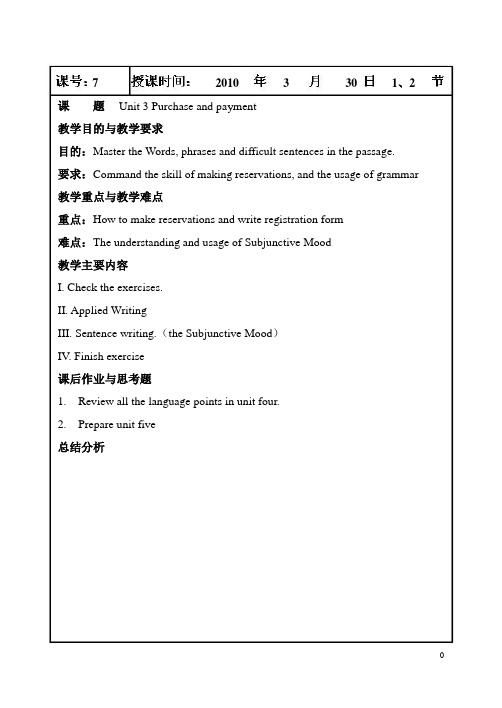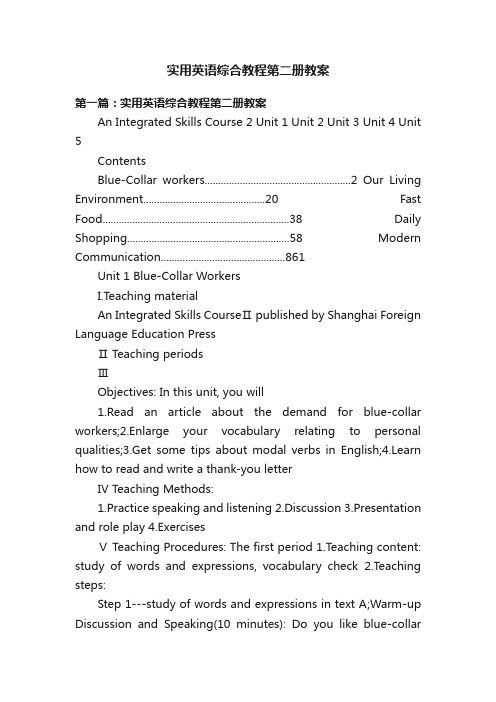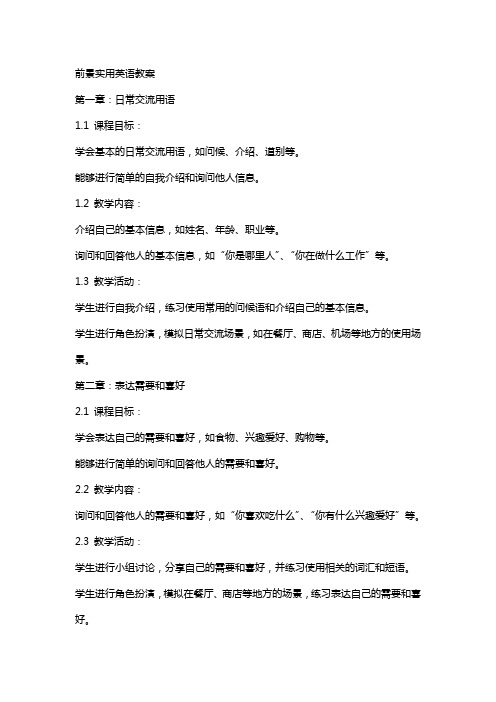前景实用英语二unit3教案
前景实用英语(二)-unit6教案

前景实⽤英语(⼆)-unit6教案三亚航空旅游职业学院教案编号Unit 6 Greening the World Begins at Home Teaching aims:In this unit, students are supposed toMaster the basic language and skills to remember wordsUnderstand the main idea of Text A, and master the useful sentence structures and words and expressions; Know how to use sentence stress;To learn Non-finite Verb;To know how to write “Business Letter”.Teaching procedures:I Listening and Speaking (2Period)II Text A & text-related exercises (2Period)III Grammar Review and Practical Writing (2Period)IV WorkbookPart A Lead inTask 1 Study the pictures and discuss the questions below in small groups. Use the words given below if necessary.1.What can we benefit from the equipment in the first picture?Cues: solar energy, renewable, green energy, water heater, electricity bill2.Do you know what the house in the second picture is called? What is specialabout it?Cues: passive house, energy-efficient, solar panel, roof3.What are the advantages of the U-shaped lamps in the third picture?Cues: saving, cut on the use of electricityTask 2 Listen to the following short dialogues and fill in the blanks.Task 3 Discuss the following questions.1. What do you think is green living?Cues: healthy, environment-friendly, lifestyle.2. What does your family do to cut energy use?Cues: water, electricity, transport, travelPart B Language points1. green v. to make greene.g. The company is making efforts to green its products.公司正竭尽全⼒使产品更环保。
前景实用英语(二)-unit3教案

前景实用英语(二)-unit3教案三亚航空旅游职业学院教案编号Unit 3 Knowledge and SkillsTeaching aims:In this unit, students are supposed to▪know how to talk about learning in daily life;▪master the basic language to express reassuring and persuading;▪understand the main idea of Text A, and master the useful sentence structures and words and expressions;▪master the phonetic skill: assimilation;▪know substantive clause;▪know how to write “A Postcard”.Teaching procedures:I Listening and Speaking (2Period)II Text A & text-related exercises (2Period)III Workbook & text-related exercises (2Period)IV Grammar Review and Practical Writing (2Period)Part A Lead inTask 1 Study the pictures and discuss the questions below in small groups. Use the words given below if necessary.1.What are the people in the first picture doing?Cues: basketball, training, trainer, trainee2.How do you understand the words in the second picture? Do you knowthe Chinese for it ?Cues: the more ... the better ..., practice, learn, well3.What is “stage fright”?Cues: fear, anxiety, public, audience, sweaty handsTask 2 Listen to the following short dialogues and fill in the blanks.Task 3 Discuss the following questions.1. How can we learn a skill?Cues: knowledge, practice, familiar, second nature2.Have you ever had any experience of stage fright? If yes, please share onewith the class.Cues: knowledge, practice, familiar, second naturePart B Text ALearning Knowledge and Skill: PracticeLanguage points:Leakya. having holes or cracks that allow liquid or gas to escapee.g. Water came from the leaky roof.水从屋顶漏下来。
新编实用英语综合教程第二册unit3课后练习答案

新编实用英语综合教程第二册unit3课后练习答案新编实用英语综合教程第二册Unit 3课后习题答案P39-11 speak2. where is he3. might be with4. leave a message5. call me6. 667-34527. welcomeP39- 21. Hello , May I speak to Mr. Smith please2.Yes , please , tell hime to call the director's office , the number is 864-35093. It would be best if he cold call this afternoon , at about 2o'clock4. thanks a lotP39-31. Hello2. I am sorry , but he is not in at the moment , would you like to leave a message ?3. I 'll tell her as soon as he is back4. You're welcome .P40-31. a telephone message2. a memo3. phone4. at home5. personal6. skills7. a message8. expect9. who called10. what was the message11. friends and family12. questions13. when they called14. the person calling15. reach himP41-41- b 2- dP43-11. Because people stopped talking face to face to one another2. Because his friends was busy talking on the phone , completely forgetting his present3. Because they can be used anywhere and anytime4. Without seeing or talking to one another and with voice mail , we can conduct entire poeple losetheir inimacy of interaction .5. People lose their intimacy of interaction6. He thinks it's great , but worries about its unintended consequences .P43-21. disconnected2. set back3. internet4. talking5. reaching6. answer7. contact8. goes up9. phone10. automatedP43-31. the communications revolution2. their cell phones3. electronic voice4. e-mail5. voice mail6. Directory assistance7. greatP44-41. burden2. advances3. lonely4. invisible5. insert6. attendents7. pets8. chain9. preferable10. deposit11. interrupted12. EvidentlyP44-51. Please dial home and tell them I am on the way to the company2. Since then there was never been any setback in production3. I saw him insert the key into the lock4. I suggest that you make a deposit at the bank5. Yesterday Mr.wang checked out from that hotel .P44- 61. The hall was filled with students waiting for the interview .The square of the village was filled with people waching the football match2. We used to grow beautiful rosesPeter used to go to the small town3. Why is it that this conclusion is wrongwhy is it that she can sing better than I4. As I knew him better , I discovered that my first impression of him was right .We got wiser as we get older5. Why use wood when you can use plastic ?why ask me to do it when you can do it yourself ?6. Pretty soon you won't have the burden of cooking breakfast for himpretty soon you won't take the trouble to send her to go to school everymorning .P46-71-T 2- F 3-T 4-T 5- T 6- F 7-T8- T 9-F 10- T 11. T 12- TP47-91. 不管有时是字母与数字混合使用,所有电话号码都是7位数字。
新编实用英语综合教程第二册第三单元

7 2010 3 30 1、2 课题Unit 3 Purchase and payment教学目的与教学要求目的:Master the Words, phrases and difficult sentences in the passage.要求:Command the skill of making reservations, and the usage of grammar 教学重点与教学难点重点:How to make reservations and write registration form难点:The understanding and usage of Subjunctive Mood教学主要内容I. Check the exercises.II. Applied WritingIII. Sentence writing.(the Subjunctive Mood)IV. Finish exercise课后作业与思考题1. Review all the language points in unit four.2. Prepare unit five总结分析教学过程教学环节与时间分配1. My name is Vanessa Saunders.我名叫雯妮莎桑德斯。
2. I have visited China sixteen times since 1978.1978年以来,我已来过中国16次。
3. I have been conducting tradeshows and setting up tradeshow exhibitions for a variety of international clientsa. conduct: vt.引导,经营。
Eg. The headmaster conducted us round the school.校长带引我们在学校里参观了一圈。
新编实用英语综合教程二Unit-3-Communication-by-Phone专业课件PPT

● Refer to the Data Bank in the Workbook for relevant expressions.
Back
7
Studying Telephone Messages
Study and Imitate 3 Taking or leaving a telephone message is part of a secretary’s job. Now let’s
Bill: I’m sorry. Lady: That’s all right.
Back
11
Putting Language to Use
Speak and Complete
5 Imagine you are calling Judy. Complete the following conversation with her by filling in the blanks.
I speak You: Hi, Judy. It’s Mike. May 1 ______________ to Ken? Judy: I’m sorry, Mike, but Ken’s not here now. You: He isn’t? 2 ___W_h_e_r_e_i_s_h_e___? Judy: He’s at a movie. You: A movie? Who’s he with? Judy: Well, uh, I think he 3 ______________ Eva.
Putting Language to Use
Speak and Complete
Speak and Translate
Speak and Communicate
实用英语综合教程第二册教案

实用英语综合教程第二册教案第一篇:实用英语综合教程第二册教案An Integrated Skills Course 2 Unit 1 Unit 2 Unit 3 Unit 4 Unit 5ContentsBlue-Collar workers......................................................2 Our Living Environment.............................................20 Fast Food.....................................................................38 Daily Shopping............................................................58 Modern Communication. (861)Unit 1 Blue-Collar WorkersI.Teaching materialAn Integrated Skills CourseⅡ published by Shanghai Foreign Language Education PressⅡ Teaching periodsⅢObjectives: In this unit, you will1.Read an article about the demand for blue-collar workers;2.Enlarge your vocabulary relating to personal qualities;3.Get some tips about modal verbs in English;4.Learn how to read and write a thank-you letterⅣ Teaching Methods:1.Practice speaking and listening2.Discussion3.Presentation and role play4.ExercisesⅤ Teaching Procedures: The first period 1.Teaching content: study of words and expressions, vocabulary check 2.Teaching steps:Step 1---study of words and expressions in text A;Warm-up Discussion and Speaking(10 minutes): Do you like blue-collarjobs? What is your favorite blue-collar job and why?Hints: I like blue-collar jobs because(1)the demand is huge;(2)you can get professional training and technical knowledge;(3)the salary is goodMy favorite blue-collar job is that of a gardener, because(1)I can work outdoors and enjoy the fresh air;and(2)I can keep fit and get good pay(The students will probably have trouble with English expressions relating to blue-collar jobs.The teacher may allow the students to answer this question in Chinese, and then give the students key terms in English and ask them to express their ideas again in English.)Background Information(5 minutes)Blue-collar workers(TB P2)Different categories of jobs(blue-collar/golden-collar/pink-collar/grey-collar/white-collar)Introduce new words on board:(20 minutes)heartland resident workforcereplacementreplaceshortage manufacturermanufacture remarkable recoveryannualearnings earnpoint togap high-end decline expand certificateprograminvestmentinvest find a way upStep 2—Practice: Vocabulary Check and Oral English(10 minutes)Give students 5 minutes to finish exercises A in Page 9Everyday English 1.If you want to stop someone and ask him/her for directions, what do you usually say to him/her first?(Excuse me.)2.If you don’t quite understand what the person has told you about the directions, what can you do?(Although one can always say “I beg you pardon?” or “Could you say it again?” try not to make the person repeat more than twice.Instead, you may repeat what you’ve already understood and let the person tell you the test.)3.While traveling in a foreign country, what would you bring along to make your travel easier?(A road map.)The second period 1.Teaching content: Discussion and Comprehensive of Text A 2.Teaching steps:Step 1---Warm up(10 minutes)(invite some students to explain the meaning of the difficult sentences of the text A in English or in Chinese, teacher may give them some hints.) Step2---Language Points(25 minutes)1)To many… offer its residen ts: For many people, America’s industrial heartland can’t provide enough work to its residents.too little: not too much, not enough 太少Too much work and too little rest often lead to illness.过量的工作和过少的休息会引起疾病。
前景实用英语教案

3. Do you like T-shirts with words?
Cues: message, simple
2. Call a few groups to report the result of their discussion.
Cues: ideas, taste, imitate
Step Five
New words in Text A
(mainly using the method of explaining)
1. Tell students we will learn the new words and expressions in Text A“Greening the World Begins at Home”.
Step Three
Task2
Listening(mainly training Ss’ listening ability by guiding them how to listen)1. There are two listening dialogues in this task. The students can be allowed to read the dialogues first and try to finish the blanks in the dialogues.
1. Have you had the experience of not knowing what to wear on a certain day?
Cues: occasion, feeling
2. Do movies, advertisements or fashion magazines have any impact on you?
前景实用英语教案

前景实用英语教案第一章:日常交流用语1.1 课程目标:学会基本的日常交流用语,如问候、介绍、道别等。
能够进行简单的自我介绍和询问他人信息。
1.2 教学内容:介绍自己的基本信息,如姓名、年龄、职业等。
询问和回答他人的基本信息,如“你是哪里人”、“你在做什么工作”等。
1.3 教学活动:学生进行自我介绍,练习使用常用的问候语和介绍自己的基本信息。
学生进行角色扮演,模拟日常交流场景,如在餐厅、商店、机场等地方的使用场景。
第二章:表达需要和喜好2.1 课程目标:学会表达自己的需要和喜好,如食物、兴趣爱好、购物等。
能够进行简单的询问和回答他人的需要和喜好。
2.2 教学内容:询问和回答他人的需要和喜好,如“你喜欢吃什么”、“你有什么兴趣爱好”等。
2.3 教学活动:学生进行小组讨论,分享自己的需要和喜好,并练习使用相关的词汇和短语。
学生进行角色扮演,模拟在餐厅、商店等地方的场景,练习表达自己的需要和喜好。
第三章:询问方向和地点3.1 课程目标:学会询问方向和地点,如问路、找到某个地方等。
能够准确地表达自己的位置和方向。
3.2 教学内容:常用的询问方向和地点的词汇和短语,如“请问在哪里”、“怎么走”等。
表达自己的位置和方向,如“我在超市的旁边”、“你往前走,左转”等。
3.3 教学活动:学生进行角色扮演,模拟在街头问路的情景,练习使用相关的词汇和短语。
学生进行小组活动,制作简单的地图,练习表达自己的位置和方向。
第四章:描述人和事物4.1 课程目标:学会描述人和事物的特征和属性,如外貌、性格、喜好等。
能够准确地表达自己的观察和看法。
4.2 教学内容:常用的描述人和事物的词汇和短语,如“高个子”、“善良的”、“喜欢音乐”等。
表达自己的观察和看法,如“我觉得他很聪明”、“她看起来很累”等。
4.3 教学活动:学生进行小组讨论,描述自己或他人的外貌和性格特点,并练习使用相关的词汇和短语。
学生进行角色扮演,模拟在面试或相亲等场合描述自己和对方的特征和属性。
